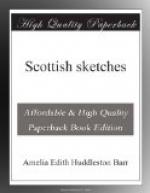You may see his gravestone in Glasgow Necropolis to-day, and people will tell you that he was a great philanthropist, and gave away a noble fortune to the sick and the ignorant; and you will probably wonder to see only beneath his name the solemn text, “Vengeance is mine; I will repay, saith the Lord.”
Facing His Enemy.
FACING HIS ENEMY.
CHAPTER I.
Forty years ago there stood in the lower part of the city of Glasgow a large, plain building which was to hundreds of very intelligent Scotchmen almost sacred ground. It stood among warehouses and factories, and in a very unfashionable quarter; but for all that, it was Dr. William Morrison’s kirk. And Dr. Morrison was in every respect a remarkable man—a Scotchman with the old Hebrew fervor and sublimity, who accepted the extremest tenets of his creed with a deep religious faith, and scorned to trim or moderate them in order to suit what he called “a sinfu’ latitudinarian age.”
Such a man readily found among the solid burghers of Glasgow a large “following” of a very serious kind, douce, dour men, whose strongly-marked features looked as if they had been chiselled out of their native granite—men who settled themselves with a grave kind of enjoyment to listen to a full hour’s sermon, and who watched every point their minister made with a critical acumen that seemed more fitting to a synod of divines than a congregation of weavers and traders.
A prominent man in this remarkable church was Deacon John Callendar. He had been one of its first members, and it was everything to his heart that Jerusalem is to the Jew, or Mecca to the Mohammedan. He believed his minister to be the best and wisest of men, though he was by no means inclined to allow himself a lazy confidence in this security. It was the special duty of deacons to keep a strict watch over doctrinal points, and though he had never had occasion to dissent in thirty years’ scrutiny, he still kept the watch.
In the temporal affairs of the church it had been different. There was no definite creed for guidance in these matters, and eight or ten men with strong, rugged wills about L, s., d., each thinking highly of his own discretion in monetary affairs, and rather indifferently of the minister’s gifts in this direction, were not likely to have always harmonious sessions.
They had had a decidedly inharmonious one early in January of 184-, and Deacon Callendar had spoken his mind with his usual blunt directness. He had been a good deal nettled at the minister’s attitude, for, instead of seconding his propositions, Dr. Morrison had sat with a faraway, indifferent look, as if the pending discussion was entirely out of his range of interest. John could have borne contradiction better. An argument would have gratified him. But to have the speech and statistics which he had so carefully prepared fall on the minister’s ear without provoking any response was a great trial of his patience. He was inwardly very angry, though outwardly very calm; but Dr. Morrison knew well what a tumult was beneath the dour still face of the deacon as he rose from his chair, put on his plaid, and pulled his bonnet over his brows.




